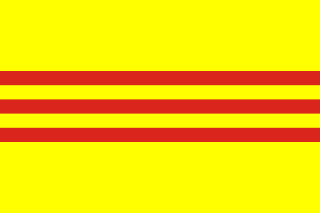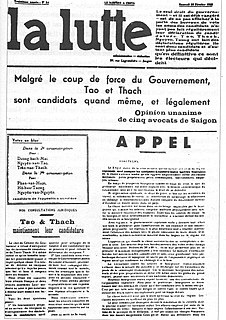
French Indochina, officially known as the Indochinese Union and after 1947 as the Indochinese Federation, was a grouping of French colonial territories in Southeast Asia until its demise in 1954. It comprised Cambodia, Laos, the Chinese territory of Guangzhouwan, and the Vietnamese regions of Tonkin in the north, Annam in the centre, and Cochinchina in the south. The capital for most of its history (1902–45) was Hanoi; Saigon was the capital from 1887 to 1902 and again from 1945 to 1954.

Trotskyism is the political ideology and branch of Marxism developed by Ukrainian-Russian revolutionary Leon Trotsky and by some other members of the Left Opposition and Fourth International. Trotsky self-identified as an orthodox Marxist, a revolutionary Marxist, and Bolshevik–Leninist, a follower of Marx, Engels, and of 3L: Vladimir Lenin, Karl Liebknecht, Rosa Luxemburg. He supported founding a vanguard party of the proletariat, proletarian internationalism, and a dictatorship of the proletariat based on working class self-emancipation and mass democracy. Trotskyists are critical of Stalinism as they oppose Joseph Stalin's theory of socialism in one country in favor of Trotsky's theory of permanent revolution. Trotskyists also criticize the bureaucracy and anti-democratic current that developed in the Soviet Union under Stalin.

The Fourth International (FI) is a revolutionary socialist international organization consisting of followers of Leon Trotsky, also known as Trotskyists, whose declared goal is the overthrowing of global capitalism and the establishment of world socialism via international revolution. The Fourth International was established in France in 1938, as Trotsky and his supporters, having been expelled from the Soviet Union, considered the Communist International as effectively puppets of Stalinism and thus incapable of leading the international working class to political power. Thus, Trotskyists founded their own competing Fourth International.

The Communist Party of Vietnam (CPV) is the founding and sole legal party of the Socialist Republic of Vietnam. Although it nominally exists alongside the Vietnamese Fatherland Front, it maintains a unitary government and has centralized control over the state, military, and media. The supremacy of the CPV is guaranteed by Article 4 of the national constitution. Founded in 1930, the CPV became the ruling party of North Vietnam in 1954 and then all of Vietnam in 1976 after seizing power in South Vietnam.

Tạ Thu Thâu (1906–1945) in the 1930s was the principal representative of Trotskyism in Vietnam and, in colonial Cochinchina, of left opposition to the Indochinese Communist Party (PCI) of Nguyen Ai Quoc. He was executed by the Viet Minh in September 1945.

The State of Vietnam was a member of the French Union and a country that claimed authority over all of Vietnam during the First Indochina War, although large parts of its territory were controlled by the Democratic Republic of Vietnam of the Việt Minh. The state was created in 1949 by France as part of the French Union and was internationally recognised in 1950. Former Emperor Bảo Đại became Chief of State. After the 1954 Geneva Agreements, the State of Vietnam abandoned its sovereignty over the northern part of the country, which was controlled by the Việt Minh. Ngô Đình Diệm was appointed prime minister the same year and—after having ousted Bảo Đại in 1955—became president of the Republic of Vietnam.
The Internationalist Communist Party was a Trotskyist political party in France. It was the name taken by the French Section of the Fourth International from its foundation until a name change in the late 1960s.

French Cochinchina was a colony of French Indochina, encompassing the whole region of Lower Cochinchina or Southern Vietnam from 1862 to 1946. The French operated a plantation economy whose primary strategic product was rubber.
Nguyễn Hải Thần was a leader of the Việt Nam Cách Mạng Đồng Minh Hội and a political leader during the Vietnamese Revolution. In 1905, he left Vietnam to study at military academies first in Japan then in China as part of Phan Bội Châu's Đông-Du Movement. In 1912, he joined Châu's Vietnam Restoration League and became one of its representatives in Kwangsi and one of its most capable military leaders.

The Việt Nam Quốc Dân Đảng, abbreviated VNQDĐ or Việt Quốc, was a nationalist and democratic socialist political party that sought independence from French colonial rule in Vietnam during the early 20th century. Its origins lie in the mid-1920s, when a group of young Hanoi-based intellectuals began publishing revolutionary material. In 1927, after the publishing house failed because of French harassment and censorship, the VNQDD was formed under the leadership of Nguyễn Thái Học. Modelling itself on the Kuomintang of Nationalist China the VNQDD gained a following among northerners, particularly teachers and intellectuals. The party, which was less successful among peasants and industrial workers, was organised in small clandestine cells.

Trotskyism in Vietnam was represented by those who, in left opposition to the Indochinese Communist Party (PCI) of Nguyen Ai Quoc, identified with the call by Leon Trotsky to re-found "vanguard parties of proletariat" on principles of "proletarian internationalism" and of "permanent revolution". Active in the 1930s in organising the Saigon waterfront, industry and transport, Trotskyists presented a significant challenge to the Moscow-aligned party in Cochinchina. Following the September 1945 Saigon uprising against the restoration of French colonial rule, Vietnamese Trotskyists were systematically hunted down and eliminated by both the French Sûreté and the Communist-front Viet Minh.

Phan Văn Chánh (1906–1945) was a Vietnamese activist and Trotskyist.
Ngô Văn Xuyết, alias Ngô Văn was a Vietnamese revolutionary who chronicled labour and peasant insurrections caught "in the crossfire" between the colonial French and the Indochinese Communist Party of Nguyễn Ái Quốc. As a Trotskyist militant in the 1930s, Ngô Văn helped organise Saigon's waterfront and factories in defiance of the Party's "Moscow line" which sought to engage indigenous employers and landowners in a nationalist front and the French in an "anti-fascist" and anti-Japanese alliance. When, after 1945, further challenges to the Party met with a policy of targeted assassination, Ngô Văn went into exile. In Paris experiences shared with anarchist and Poumista refugees from the Spanish Civil War suggested " new radical perspectives." Drawn into the Council Communist circles of Maximilien Rubel and Henri Simon, Ngô Văn "permanently distanced" himself from the model of "the so-called workers's party."
Anarchism in Vietnam as a political movement started in the early twentieth century, as Vietnamese radicals became exposed to strands of anarchism in Japan, China and France. Its most recognizable proponents were Phan Bội Châu and Nguyễn An Ninh.
Communism in Vietnam is linked to the Politics of Vietnam and the push for independence. Marxism was introduced in Vietnam with the emergence of three communist parties; the Indochinese Communist Party, the Annamese Communist Party and the Indochinese Communist Union, later joined by a Trotskyist movement led by Tạ Thu Thâu. In 1930 the Communist International (Comintern) sent Nguyễn Ái Quốc to Hong Kong to coordinate the unification of the parties into the Vietnamese Communist Party with Trần Phú as its first Secretary General.

La Lutte was a left-wing paper published in Saigon, French-colonial Cochinchina, in the 1930s. It was launched ahead of the April–May 1933 Saigon municipal council election as a joint organ of the Indochinese Communist Party (PCI) and a grouping of Trotskyists and others who agreed to run a joint "Workers' slate" of candidates for the polls. This kind of cooperation between Trotskyists and Comintern-linked communists was a phenomenon unique to Vietnam. The editorial line of La Lutte avoided criticism of the USSR while supporting the demands of workers and peasants without regard to faction The supporters of La Lutte were known as lutteurs.

Nguyễn An Ninh was a radical Vietnamese political journalist and publicist in French colonial Cochinchina. An independent and charismatic figure, Nguyen An Ninh was able to conciliate between different anti-colonial factions including, for a period in the 1930s, between the Communist Party of Nguyen Ai Quoc and its left, Trotskyist, opposition. Nguyen An Ninh died in the French penal colony of Pulo Condore, age 42. He is recognised by the Socialist Republic of Vietnam as a Revolutionary Martyr.

Political organizations and Armed forces in Vietnam, since 1912:

Phan Văn Hùm was a Vietnamese journalist, philosopher and revolutionary who, from 1930, participated in the Trotskyist left opposition to the Communist Party of Nguyen Ai Quoc.
Colonial Council elections were held in French Cochinchina on 16 April 1939.













